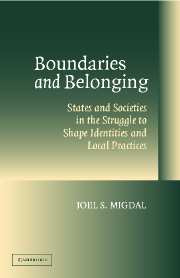 Boundaries and Belonging
Boundaries and Belonging Book contents
- Frontmatter
- Contents
- List of Contributors
- Preface and Acknowledgments
- PART I INTRODUCTION
- PART II ON THE EVE OF THE NATION-STATE: THE OTTOMAN EMPIRE
- PART III THE STATE AND “DANGEROUS POPULATIONS”
- PART IV INSCRIBING MEMBERSHIP AND CONTESTING MEMBERSHIP IN THE NATION
- PART V BEYOND THE STATE: TRANSNATIONAL FORCES AND THE CHALLENGE TO THE STATE
- PART VI CONCLUSION
- Index
Preface and Acknowledgments
Published online by Cambridge University Press: 25 July 2009
- Frontmatter
- Contents
- List of Contributors
- Preface and Acknowledgments
- PART I INTRODUCTION
- PART II ON THE EVE OF THE NATION-STATE: THE OTTOMAN EMPIRE
- PART III THE STATE AND “DANGEROUS POPULATIONS”
- PART IV INSCRIBING MEMBERSHIP AND CONTESTING MEMBERSHIP IN THE NATION
- PART V BEYOND THE STATE: TRANSNATIONAL FORCES AND THE CHALLENGE TO THE STATE
- PART VI CONCLUSION
- Index
Summary
This book began to take shape in two workshops that were held at the University of Washington in July 1999 and September 2000. For me and, I think, for the others who attended, those workshops were extremely exciting. They played with and integrated some of the most compelling current topics in the social sciences: issues of borders, multiple and changing identities, differing vectors and senses of belonging, states, the lines between public and private space, and more. Perhaps what made them so exciting to me was that they brought new voices to some of the old questions in comparative studies. In this volume, all the contributors except Yeşim Arat, Reşat Kasaba, and me received their Ph. D. s after 1995.
It is not simply that this volume introduces bright new minds. These scholars bring a new sensibility to the study of comparative politics and society. All are area experts with deep knowledge of one or more parts of the globe, but they have used their immersion in a place as a way of seeing how old boundaries have been transgressed, even obliterated. They have used their area knowledge to bypass old binaries, such as between migration and stasis, state and society, public and private, national and transnational. Their methodological orientation is to look beyond the lines dividing these supposed opposites to their ongoing interplay, leading to unexpected processes and results.
- Type
- Chapter
- Information
- Boundaries and BelongingStates and Societies in the Struggle to Shape Identities and Local Practices, pp. ix - xPublisher: Cambridge University PressPrint publication year: 2004
